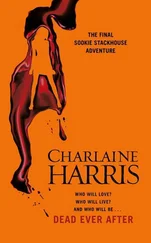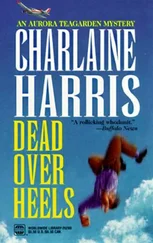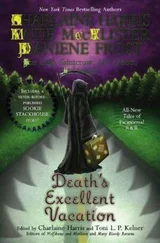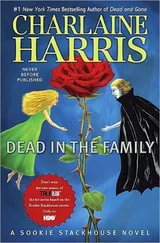If I’m wrong (and of course I’m wrong), he will never know I thought for one minute that he was connected with murder, she told herself.
Catherine lowered her eyes so they wouldn’t meet Randall’s inadvertently.
Maybe, just for now, I shouldn’t tell him what Betty said, she reflected hesitantly. After all, her story is only confirmation of a half-baked theory of his, about Leona overhearing something at Daddy’s office. It may not mean anything, right? And everyone who might have known something about this case is dead. Everybody but me…and Betty. Betty is the only possible living eyewitness to any portion of this whole chain of deaths.
Catherine realized she had just talked herself out of telling Randall about Betty’s little story. She had reached a test of faith she couldn’t pass.
Randall was still involved with his caller. Catherine tried to assume a natural expression and rose from her chair. When Randall glanced up inquiringly, she made typing gestures with her fingers. He nodded that he understood, and she eased out of his office. She moved toward her desk like an automaton and, once settled in her chair, folded her hands stiffly in her lap and stared at the wall. She was as miserable as she ever had been in her life.
When Randall’s mother passed through the room, Catherine had to force herself to speak.
“Miss Angel,” she said in a lifeless voice, “if you’d get me Tom’s personnel file I’d appreciate it. I have to write a story.”
Angel eyed Catherine sharply and then nodded briskly. She brought Tom’s file to Catherine’s desk, along with Randall’s notes from his conversation with Jerry Selforth and the sheriff. Randall had been prepared to write the story if she had not come in, Catherine realized dully.
She rolled paper into the platen, flexed her tense fingers, took a deep breath, and began to type.
“Tom Mascalco, 21, a reporter for the LowfieldGazette , died Tuesday night as the result of wounds sustained in a struggle in his home.”
When the story was almost finished, she had to buzz Randall to ask when Tom’s funeral services would be held.
“Friday,” he said wearily. “Holy Mary of the Assumption, in Memphis. Ten o’clock. We’ll have to go.”
It was the only time she spoke to him for the rest of the day.
During the afternoon, Sheriff Galton sent Deputy Ralph Carson to go through Tom’s desk, to see if it contained any notes that might be regarded as clues. Ralph was courteous but remote. They might have barely known each other, instead of having dated off and on through high school, sharing hayrides, dances, and drinks. He was married now, with two children, Catherine remembered. But the gulf between them was far wider than the gap in time and circumstances.
He’s definitely keeping his distance until he sees which way the cat jumps, she thought. But he has to be polite. After all, what if I didn’t do it?
And provoking that courtesy, making him speak when he wanted to finish his job and leave, gave her an awful enjoyment.
The notes Tom had made on Leona’s murder contained nothing that was not commonly known.
While Catherine identified items and notes to help the deputy, she also transferred Gazette material-sheets of columns and comic strips-to her own desk. She would have to handle that now.
As she gathered up the columns, she saw Tom leaning back in his chair, reading them with lazy interest, trying to decide which ones should be in next week’s paper…pulling on his mustache, smiling, as he no doubt thought about persuading Leila to bed that evening.
For a moment her grasp weakened, and the sheets almost cascaded to the floor; but the next second she had hold of them again, and put them on her desk.
Then there was Tom’s camera, in a bottom desk drawer. He had preferred to use his own, instead of the Gazette ’s. It had film in it, she saw, and she realized she had to remove and develop the film before the camera could be returned to Tom’s parents.
She thought of a question to ask Ralph Carson.
“About the house,” she said abruptly.
He looked surprised.
“The one Tom rented from me,” she explained. “What can I do about getting it cleaned? His parents will have to get in there to get his things out. They can’t see that.”
“Oh,” he said. “Well, you could see if you could hire some prisoners from the jail to do it. Some trustees, maybe. They might be glad to do it for the money. Why don’t you ask the sheriff?”
“I’ll do that,” she said, and they continued their fruitless sifting. All they found were a couple of magazines that made Carson turn red and caused Catherine to lift her eyebrows. She pitched them into Tom’s wastebasket.
It was just as well, she decided, that she had gone through the desk instead of someone else.
When Carson left, his hands empty and his face glum, Catherine sat down at her desk and looked around aimlessly. She had to do something.
Her eyes lit on Tom’s camera. She would develop the film in it. No one would bother her in the darkroom.
The reporters’ tiny darkroom was to the left of the door that led to the production department. Catherine grabbed up the camera, buzzed Angel to tell her she was still incommunicado, and dived into the little room, turning on the red light that shone outside when film was being processed. Now no one could talk to her for a good length of time.
The smock she wore to protect her clothes from chemicals was hanging in its usual place on a hook on the door. Tom’s heavy denim work apron was beside it. On an impulse, she ran her hands through the pockets of the apron. There was nothing in them, and her mouth twisted in self-derision as she let it fall back against the door.
She pulled on her smock, snapping it down the front, and looked around the darkroom to make sure where everything was before she turned off the lights.
While the film developed there was nothing to do but wait. Catherine lit a cigarette and propped herself against the high counter.
This was the nicest moment of a jarring day. She lounged in the eerie red glow, safe from intrusion because of the light shining outside the door. The Gazette ’s little darkroom satisfied her catlike fondness for small places.
The “bing!” of the timer roused her from her reverie. She finished developing the film, her mind at ease and refreshed by the isolation and darkness.
Other places had big beautiful dryers, Catherine thought enviously. The Gazette had a clothesline and some clamps and a fan.
While the film was hanging from the clothesline, drying, Catherine switched on the light and examined the half-used roll of film. The pictures were, as she had supposed, Tom’s shots of the Lion’s Club meeting, featuring its guest speaker, the lieutenant governor. In reversed black and white, Catherine saw shots of a speaker at a podium, and men seated in rows at a U-shaped collection of tables, the plates in front of them showing up as black circles.
Somehow, Tom’s last pictures should have been of something more memorable, Catherine thought.
He had been by far a better photographer than she, but he had been too impatient to enjoy darkroom work. She had often developed his film while she did her own.
He made me feel like a regular Martha, Catherine thought: and despite her weariness and confusion, the peace of the little room relaxed her so that she could smile at the recollection. She was beginning to assimilate the fact that Tom was gone.
She decided to enlarge all the shots. It would take up time, while keeping her busy with something she enjoyed. And besides, she was not a good interpreter of negatives. Tom had been able to run a look down the film and choose this one or that one, as the best shots. Catherine had to put much more time and thought into picking out pictures.
Читать дальше












